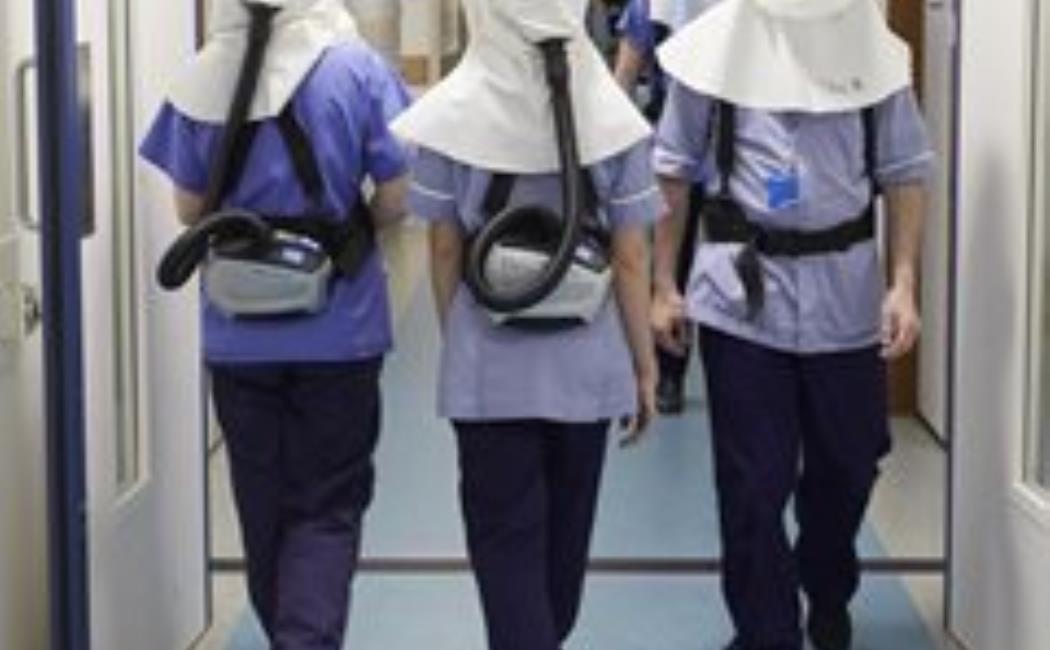The fight against COVID-19
Antonio explains: “At the first design stage the PeRSo team approached me to 3D print some parts for their project as I often 3D print in my own research. I started with a few parts and got more and more involved. In the end, we worked as an assembly line and almost non-stop until we got a reliable prototype ready to be mass manufactured for the fight against COVID-19.”
PeRSo: a prototype personal respirator in one week
Engineers from the
University of Southampton in collaboration with clinicians at
University Hospital Southampton (UHS), developed a pioneering protective respirator hood known as
PeRSo. In just two weeks, the equipment was developed into a prototype. In less than a month it has been tested and manufactured at scale for hospital staff treating patients with the COVID-19 virus.
PeRSo consists of a waterproof fabric hood that covers the wearer's head with a plastic visor to protect their face. It has a small portable unit to deliver clean air through a High Efficiency Particulate Air (HEPA) filter to the wearer from a battery-powered fan pack mounted on a belt. The device can be worn continuously for eight to nine hours and is reusable after cleaning.
Aside from the filtration system that filters out 99.95% of particulates from the air including the virus, the device offers other benefits like protection against accidental face touching. For patients, it offers the reassurance of being able to see the faces of the people who treat them. After frontline healthcare staff at UHS tested prototypes last month, PeRSo has been
introduced into the hospital.
From Catanzaro to Saudi Arabia
Antonio, from Calabria in south west Italy, joined KAUST in 2013 after completing his undergraduate degree at the
Universita Magna Graecia di Catanzaro in Computer Science and Biomedical Engineering. As a student in Italy, he met a group from KAUST, including Professor Enzo di Fabrizio, who encouraged him to come to Saudi Arabia for his Masters studies. Joined by three of his classmates, Antonio admits that at first the idea to study in the Middle East seemed crazy, but it was the best decision he ever made. Professor Fabrizio became Antonio’s supervisor, and mentor. His MS project focused on the development of a novel microfluidic device to analyze the chemical composition of single human cells using a technique known as Raman Spectroscopy.
Thinking back on his time at KAUST, Antonio says, “I will always remember the heat I felt when landing at Jeddah airport – in August it was VERY hot – but that was comparable to the warmth of the people I met in KAUST and all the friends I have made, with whom I am in contact even these days.”
Pursuing his Dreams
After graduating from KAUST, Antonio pursued a lifelong dream to live and study in the United Kingdom, embarking on a PhD at the University of Southampton. Antonio’s PhD followed on from his research at KAUST in the development of a microfluidic device to image and characterize human stem cells from the bone marrow for regenerative medicine purposes. Bone marrow stem cells can differentiate into bone, cartilage and fat cells and they therefore represent a very interesting sample which when fully characterized can be used to replenish and heal damaged human tissues.
With his PhD completed, Antonio chose to remain at Southampton and continue his research as a postdoctoral fellow. His work has continued on microfluidic devices to mimic urinary stents to investigate bacterial infection and how deformation of cells by means of ultrasounds can be exploited to deliver drugs. But that was before the last few months where all his attention has been on PeRSo.
The PeRSo concept has been made open-source and is available to be manufactured around the world. After the first prototype made with off-the-shelf materials and mainly aimed at the UK context, a
PeRSo-DW is currently being developed which will be made of cheap materials and use simple techniques to cover the need of respirators in the Developing World.
As initiator of the project,
Paul Elkington, Professor of Respiratory Medicine at the University of Southampton says, “It is really important to minimize the risk of infection in medical staff and stop them getting sick at the peak of the pandemic, so that they can care for others.”



Leave a Reply
Your email address will not be published. Required fields are marked *